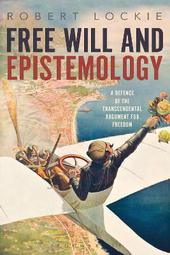
|
Free Will and Epistemology: A Defence of the Transcendental Argument for Freedom
Hardback
Main Details
| Title |
Free Will and Epistemology: A Defence of the Transcendental Argument for Freedom
|
| Authors and Contributors |
By (author) Dr Robert Lockie
|
| Physical Properties |
| Format:Hardback | | Pages:320 | | Dimensions(mm): Height 234,Width 156 |
|
| Category/Genre | Philosophy - epistemology and theory of knowledge |
|---|
| ISBN/Barcode |
9781350029040
|
| Classifications | Dewey:123.5 |
|---|
| Audience | | Tertiary Education (US: College) | |
|---|
|
Publishing Details |
| Publisher |
Bloomsbury Publishing PLC
|
| Imprint |
Bloomsbury Academic
|
| Publication Date |
11 January 2018 |
| Publication Country |
United Kingdom
|
Description
In the first in-depth study of the transcendental argument for decades, Free Will and Epistemology defends a modern version of the famous transcendental argument for free will: that we could not be justified in undermining a strong notion of free will, as a strong notion of free will is required for any such process of undermining to be itself epistemically justified. By arguing for a conception of internalism that goes back to the early days of the internalist-externalist debates, it draws on work by Richard Foley, William Alston and Alvin Plantinga to explain the importance of epistemic deontology and its role in the transcendental argument. It expands on the principle that 'ought' implies 'can' and presents a strong case for a form of self-determination. With references to cases in the neuroscientific and cognitive-psychological literature, Free Will and Epistemology provides an original contribution to work on epistemic justification and the free will debate.
Author Biography
Robert Lockie is Senior Lecturer in the School of Human and Social Sciences at the University of West London, UK.
ReviewsLockie presents a thorough, nuanced argument for a (somewhat) commonsense and intuitive theory of moral agency and freedom ... Summing Up: Recommended. Graduate students, researchers, faculty. * CHOICE * Lockie deserves praise for connecting the topics of epistemology and free will in a clear and thoughtful way ... Even more importantly, Lockie's book persuasively shows the intimate connection between deontic internalism and Libertarianism. If they are so closely related to each other, Lockie provides one of the strongest reasons in the literature for embracing Libertarian free will. * Ethical Theory and Moral Practice * [A] splendid book ... I hope the book will become a future classic in the discussion of free will. * Metaphysica * Lockie's book is a strikingly original exercise in philosophical ressourcement: refurbishing ancient philosophical theses and arguments and bringing them into conversation with predominant contemporary positions. Lockie provides linked transcendental arguments regarding the nature of our cognitive and practical agency, in favor of deontic epistemic internalism and metaphysical libertarianism. It is argued with care and style. The smart and informed critical perspective Lockie brings is a most useful stimulus, at minimum, to recognize afresh the uncertain basis of prevailing research programs - and perhaps to re-think them entirely. * Tim O'Connor, Professor of Philosophy, Indiana University, USA & Distinguished Professor of Philosophy, Baylor University, USA * In a brilliant demonstration of the continued relevance and unceasing attractions of broad-minded analytical philosophy, Lockie's book offers a fresh take on a classical style of argument - variously referred to as peritrope, Epicurean, reversal, self-refutation or transcendental - that has exercised the minds of philosophers and philosophically-minded laymen since Antiquity. In the free will debate, the argument advanced is that the denial of free will cannot be stated without that denial undermining itself. The book infuses new life into this unjustly neglected idea providing what is perhaps its most rigorous and systematic formulation to date. As such, Lockie's work is compulsory reading for all those specializing in the philosophy of free will. It will also be eminently useful to anyone interested more broadly in transcendental arguments as well as the epistemology of self-contradiction and justification. * Andras Szigeti, Associate Director of the Gothenburg Responsibility Project, University of Gothenburg, Sweden, and Senior Lecturer in Philosophy, University of Linkoeping, Sweden * The fundamental aim of Lockie's Free Will and Epistemology is to provide a transcendental argument for libertarian free will. The basis of this argument is that we can never be epistemically justified in undermining a strong notion of free will because any claim of this kind is itself justified only if we presuppose a strong notion of free will. The general argument advanced is both ambitious and rigorously presented. Lockie's book is challenging and wide-ranging and makes a significant and valuable contribution to the debate. * Paul Russell, Professor of Philosophy, University of British Columbia and Director of the Gothenburg Responsibility Project, University of Gothenburg, Sweden * Free Will and Epistemology would make a nice addition for both an upper division undergraduate course as well as a graduate level course. Indeed, I would recommend it highly for anyone who is about to enter graduate school and interested in the two main topics, as well as scholars in both fields. * Joe Campbell, Washington State University, USA * Splendid ... I hope the book will become a future classic in the discussion of free will. * Ingvar Johansson, Professor Emeritus in Theoretical Philosophy at Umea University, Sweden *
|